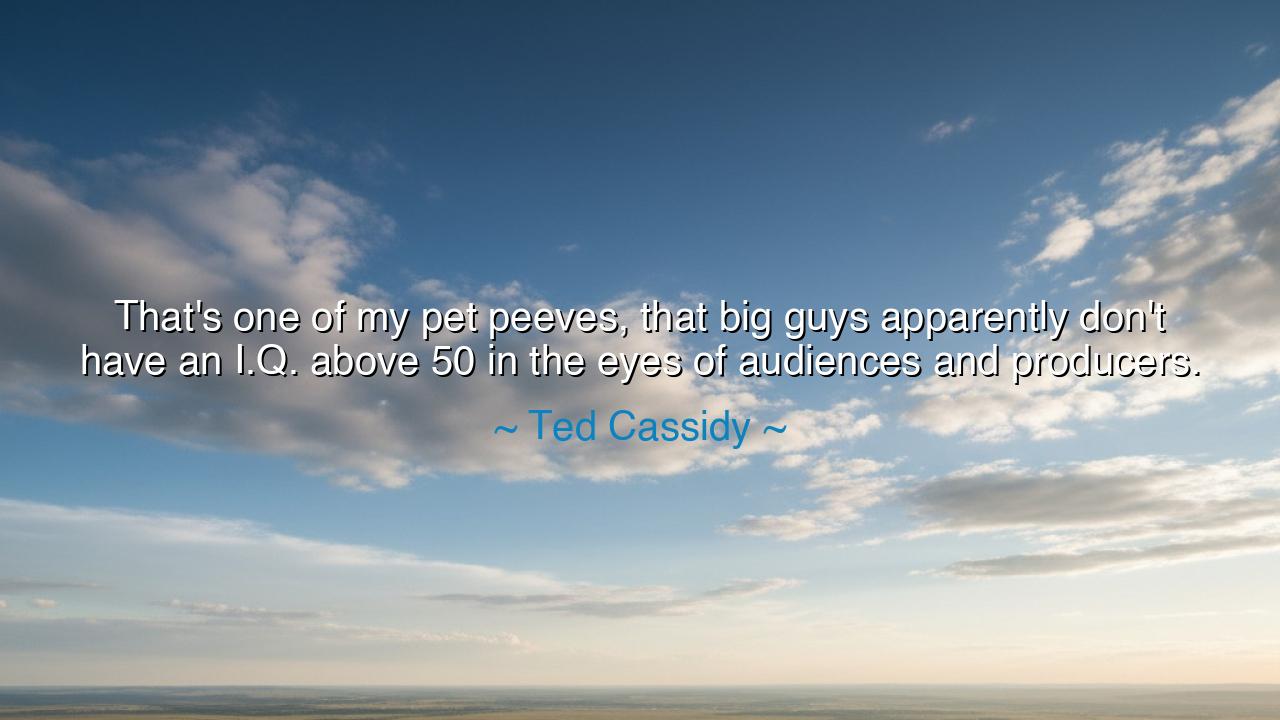
That's one of my pet peeves, that big guys apparently don't have
That's one of my pet peeves, that big guys apparently don't have an I.Q. above 50 in the eyes of audiences and producers.






Hear, O listeners, the lament of Ted Cassidy, the towering figure of stage and screen, who once declared: “That’s one of my pet peeves, that big guys apparently don’t have an I.Q. above 50 in the eyes of audiences and producers.” His words strike not only against the smallness of perception but against the chains of stereotype that have long bound human judgment. For Cassidy, known for his great height and his deep, resonant voice, bore within him intellect and talent, yet was too often cast in the narrow mold of brute strength. In his complaint lies the eternal struggle of those misjudged for their form rather than their spirit.
The ancients knew well that the body deceives. Was not Socrates mocked for his ungainly appearance, short and stout, his face likened to that of a satyr? Yet within him dwelt a mind so luminous that his words still guide mankind. The Greeks exalted Achilles for his might, but they also revered Odysseus, small in stature yet vast in cunning. Cassidy’s pet peeve echoes this ancient truth: that the eye of the ignorant looks upon the outside and thinks it knows the inside, while wisdom teaches that the true measure of a man is hidden deeper.
Consider the story of Abraham Lincoln. Tall, gaunt, awkward in movement, he was often caricatured as a simple backwoodsman. Many underestimated him, believing his height and rural manner marked him as slow of wit. Yet when his words rang out at Gettysburg, the world discovered that greatness of body did not preclude greatness of mind. Cassidy, like Lincoln, reminds us that those who appear large are not limited to physical strength, but may carry also great intelligence, sensitivity, and insight.
The pain of stereotype is not only insult but imprisonment. For when society insists that a “big guy” must be a simpleton, roles of subtlety, wisdom, or leadership are denied to him. This blindness not only injures the individual but impoverishes the whole, for the world loses the chance to see the full breadth of his gifts. Thus Cassidy’s cry is not only personal but universal: it is a call against all the prisons of assumption, whether cast by size, gender, race, or voice.
There is also a heroic defiance in his words. By naming this injustice, Cassidy declared his refusal to be reduced to a caricature. His protest is the protest of all who refuse to let others dictate their essence. Like Hercules, who bore the weight of the heavens, or Samson, whose strength was matched by his riddles, Cassidy reminds us that might and mind are not enemies but companions. The one who is large in frame can also be large in thought, and to deny this truth is to deny reality itself.
The lesson is clear: do not judge by appearances, for in doing so you betray both yourself and the one you judge. Every human being carries multitudes—strength and vulnerability, intellect and instinct, body and spirit. To reduce them to one aspect is to blind yourself to their true humanity. If you would know a person, listen to their words, observe their deeds, and honor the fullness of their being.
Practically, this means challenging the stereotypes that live not only in the world but in ourselves. When you look upon another, ask: am I seeing the person, or only the image I have been taught? Speak against lazy assumptions, whether in art, in work, or in daily life. Celebrate complexity wherever you find it. And when you yourself are reduced, rise up with dignity as Cassidy did, declaring your fullness before those who would shrink you.
So let this teaching endure: Do not mistake the vessel for the treasure within. A great frame does not mean a small mind, nor does a delicate frame mean weakness. Each person is more than the world’s labels. And those who see beyond the surface will discover the true wealth of humanity—the strength of body joined with the light of intellect, both working together to shape destiny.






AAdministratorAdministrator
Welcome, honored guests. Please leave a comment, we will respond soon